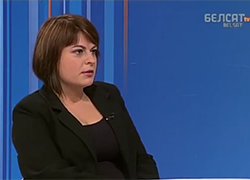Natallia Radzina: Situation in Belarus resembles martial law in Poland
17- 3.06.2013, 17:36
- 51,124

The Belarusians, like the Poles in the 1980s, need European solidarity.
Natallia Radzina, the editor-in-chief of charter97.org, gave an interview to Belsat TV channel and spoke about the opening of the European Endowment for Democracy in Brussels. She reminded that the Endowment was an initiative of Polish politicians after the events in Minsk on December 19, 2010.
“Poland is deeply concerned about Belarus and interested in solving Belarusian problems and issues. It is very important that the initiative was turned into reality. It gives us hope that Europe will not forget Belarus and support of the democratic movement in our country. As Radoslaw Sikorski has said, the Poles remember how Europe helped the Solidarity movement in 1980s. Belarus needs European solidarity today. The situation in our country resembles martial law in Poland,” Natallia Radzina said.
The Belarusian oppositions didn't have consensus at the session of Euronest, the Parliamentary Assembly of the Eastern Partnership, she says. The first part of the meeting of the Working Group on Belarus at the Euronest session was devoted to the freedom of speech, access to independent information for Belarusians and the EU's possible tools to support Belarusian independent media. The second part was political with a discussion of the question of inviting official representatives of the Belarusian authorities to the EaP Summit in Vilnius.
“The Belarusian delegation split over the issue. Anatol Liabedzka, Valery Ukhnaliou and Vital Rymasheuski adhered to a principled position that officials from the EU blacklist, including Uladzimir Makei, should not be invited to the EaP Summit unless main conditions are fulfilled: the first one is the release and rehabilitation of all political prisoners and the second one is holding free elections in compliance with the OSCE/ODIHR recommendations,” Natallia Radzina said. She added that Andrei Dzmitryeu, Yury Hubarevich and Aliaksei Yanukovich spoke for inviting Makei to the Vilnius Summit.
A proposal by Anatol Liabedzka to carry out an audit of the EU's aid to the Belarusian opposition is right, the charter97.org editor-in-chief thinks:
“It is said about huge sums spent on supporting the opposition. The independent media and human rights organisations don't actually see it. All of us feel shortage in finance, but it remains unclear where this money goes.”
Natallia Radzina noted she was surprised to learn who was invited to the meeting of the Working Group on Belarus:
“I didn't see the people who had been thrown into the KGB jail after the elections of December 19, 2010.” A few opposition members, who took part in the Euronest session, were jailed for a short term, while others were not jailed at all. The journalist didn't meet former political prisoners Andrei Sannikov and Zmitser Bandarenka, who had spent 18 months in prison: “The selectivity in this issue was very strange.”
Natallia Radzina confessed she had an opportunity to talk to MEP Justas Paleckis, whose report about improvements in the human rights situation in Belarus caused critisism from Belarusian civil society representatives and human rights defenders. “I cannot say what he told me, because it was an off-the-record conversation, but I wonder how such people can get to the European Parliament,” Natallia Radzina said.









